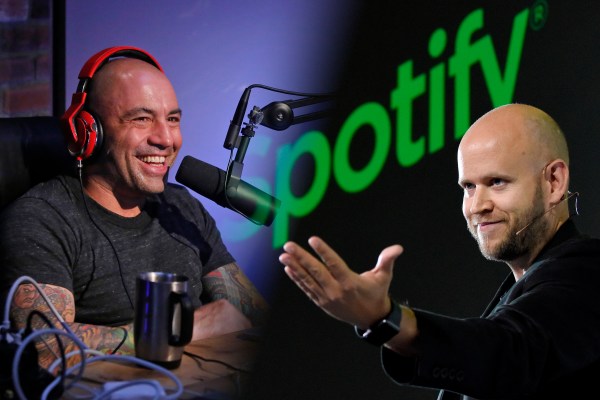We already suspected that the controversy surrounding the Joe Rogan podcast on Spotify was doing little to actually prompt users to leave the streaming service, based on app store data. Now, Spotify’s first-quarter earnings have confirmed it. Despite losing 1.5 million users in Russia, Spotify’s premium subscribers grew 15% year-over-year in the first quarter to reach 182 million, largely in line with analyst estimates. Ad-supported users, meanwhile, grew 21% to reach 252 million.
Earlier this year, several prominent musicians including Neil Young, Joni Mitchell, and others pulled their music from the streamer to protest its relationship with the controversial podcaster Joe Rogan, who was accused of using his platform to spread Covid-19 misinformation. But app store data at the time indicated rival streaming apps were not getting a boost from this latest PR headache, as Spotify’s app had continued to see millions of weekly downloads — a significantly larger figure than its nearest rivals — even amid the #deletespotify campaign on social media.
Spotify’s earnings indicate the news headlines around Rogan that dominated in the first quarter didn’t drag its business down.
The streamer beat on nearly every metric, with total monthly active users up 19% year-over-year to a record 422 million in the quarter ending March 31, above estimates of 417.1 million. Revenue rose 24% to reach 2.66 billion euros ($2.82 billion), above estimates of 2.61 billion euros. Meanwhile, average revenue per user (ARPU) was €4.38, above the expected €4.26, but down from last quarter’s €4.40. Earnings per share were €0.21, compared to the loss per share of €0.25 in the year-ago period.
Spotify cited Latin America and Europe as contributing to the user growth during the first quarter and helping to offset the loss resulting from its exit from Russia.
The stock, however, fell on weaker projections of 187 million premium subscribers in Q2, versus estimates of 189.4 million, and a lower gross margin of 25.2% versus the expected 27%. The company also said it’s expecting a loss of another 600,000 subscribers related to the closure of its service in Russia.
In its shareholder letter, Spotify touted its plans to launch “User Choice Billing” in partnership with Google, which later this year will allow Android users to pay through Spotify’s own payment system for the first time, instead of using Google Play Billing. It also noted the launch of call-to-action cards — an interactive ad format that prompts podcast listeners to take some sort of action — like clicking a button to “shop now,” for instance — while streaming. And it referenced its Q1 acquisitions of podcast advertising service Podsights and analytics platform Chartable in the quarter, which Spotify said was its largest-ever Q1 for ad-supported revenue (11% of total revenue).
Spotify’s podcast footprint also grew in the first quarter, from 3.6 million total podcasts in Q4 to now 4.0 million on its platform. The growth in monthly active users who engaged with podcast content also outstripped total monthly active user growth, it said, and podcast consumption rates grew in the double-digits year-over-year.
The company didn’t bother to reference the Rogan drama in its letter, saying only that it’s pleased with its performance and encouraged by the traction it’s seeing.
